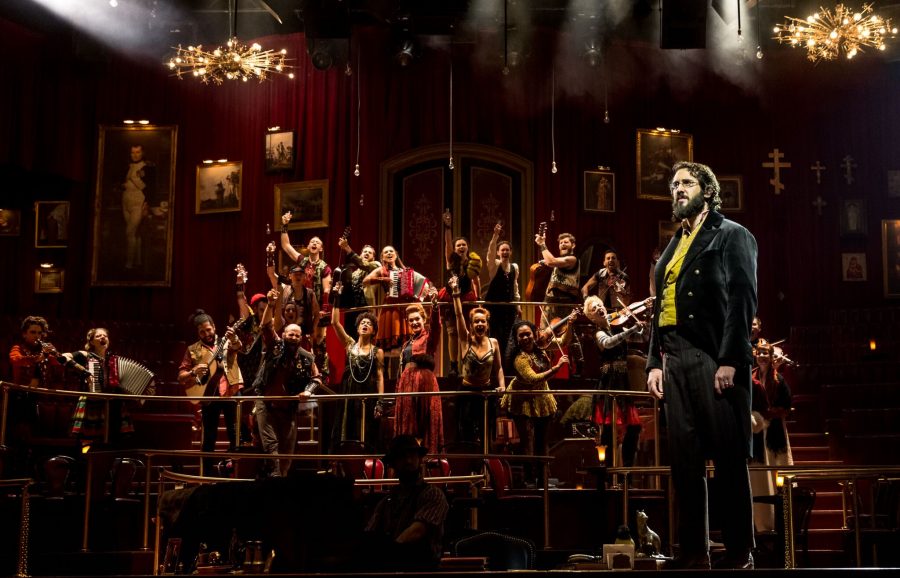Tolstoy Meets Broadway in ‘The Great Comet of 1812’
The performance effectively immersed its audience into the world of Leo Tolstoy’s War and Peace.
November 21, 2016
It may seem like a joke when an actor in the new Broadway musical “Natasha, Pierre & the Great Comet of 1812” walks up to the audience and asks ‘Who’s hungry?,’ but it’s revealed to be more than that when small boxes of pirozhki (Russian fried buns) start flying through the air. This is the first in a long line of pleasant surprises in the show, currently playing at the
Imperial Theater.
The story is based on a 70-page extract of Leo Tolstoy’s “War and Peace,” and features a huge amount of NYU talent. Aside from the phenomenal Amber Gray as Helene, Gelsey Bell provides a powerful performance as Andrey’s sister Princess Mary, Or Mattias excels as music director and Azudi Onyejekwe shines in the ensemble. In addition, both director Rachel Chavkin and choreographer Sam Pinkleton have taught at NYU.
The action starts when the beautiful young Natasha (Denee Benton) comes to visit Moscow to wait for her beloved fiance Andrey (Nicholas Benton) to return from war. In a moment of weakness, Natasha succumbs to the seduction of the charming and secretly married Anatole (Lucas Steele), leading to the quick demise of her social status. Depressed and despondent, she finds hope and compassion in Andrey’s friend Pierre (Josh Groban), a lonely outsider searching for meaning in his life.
The new electro-pop opera is an immersive experience, one that starts from the very first step into the theater. It is impossible to enter the space without gasping: red carpets and curtains are lined with gold, dainty tables stand between seats and portraits and landscapes are sprawled on the walls. The comet itself, a stunning spiked gold chandelier, looms over the center of the stage, surrounded by smaller versions throughout the theater. For her Broadway debut, set designer Mimi Lien transports the audience far from New York and into what could easily be the Bolshoi Theatre in Moscow.
The soundtrack is hard to pin down, ranging from classical opera to electronic music, with the odd Russian folk-inspired pop song for good measure. The prologue sums up the story: “It’s a complicated Russian novel / everyone has nine different names / look it up in your program.”
The first highlight comes when Natasha professes her love for Andrey with the eerily beautiful opera-inspired “No One Else.” Benton’s voice brings both chills and smiles as Natasha’s memories come to life; small extensions of the chandelier lower down and twinkle as stars, while snow falls on Andrey.
Another standout is “Charming,” where Anatole’s sister Helene convinces Natasha to go out with them. Gray’s powerful voice works beautifully with the jazz-influenced track and captures Tolstoy’s Helene in a way that’s never been done before.
Later on is “Sonya Alone,” where Natasha’s cousin (Britain Ashford) and best friend expresses worry about the strange state she’s in. As soon as Ashford starts to sing her husky, breathy voice tears at the heart and makes it clear why playwright and lyricist Dave Malloy wrote the character specifically for her.
At times, watching the show feels like reading the novel through Natasha’s perspective. Just like Natasha, the audience is blinded when noted socialites like Helene or Anatole walk on stage through a giant double door that radiates light. Natasha is a young naive country girl who is just being exposed to the bustling and overwhelming world of Moscow high society.
Groban’s Pierre is grounded and lovable, but the most exciting part of his performance is when he dances around in a fat suit while playing the accordion. While his voice is reliable and pleasant to the ear, his songs were neither memorable nor awe-inspiring. In contrast, tenor Lucas Steele steals the show as Anatole, hitting notes that leave the audience gaping while he swaggers around the stage.
Unfortunately, “The Great Comet of 1812” is both a mediocre and an unsatisfying chapter of the story to end on. Malloy’s choice not to include “The Epilogue” chapter of the novel leaves the audience with too many questions unanswered and too many things unsaid. This is exactly what this show needs, as the current ending is what stands in between the show being great and truly spectacular.
The entire production is a giant immersive high-involvement spectacle that proves to be just what the story needs. Well-written characters narrate their own actions and extend their hands so audience members kiss them. It is absolutely ridiculous, which is precisely what makes it so entertaining.
“Natasha, Pierre & the Great Comet of 1812” is playing now at the Imperial Theater.
A version of this article appeared in the Monday, Nov. 21 print edition. Email Kamila Daurenova at [email protected].



























































































































































